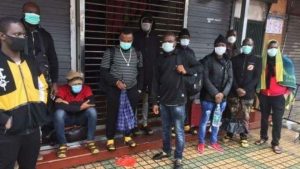The COVID-19 pandemic has at times brought out the best in humanity; at others it has exposed our flaws. Contrast, for instance, China’s mass donation of COVID-19-fighting equipment to Africa with the mistreatment African migrants have recently faced in the southern Chinese city of Guangzhou.
Social media footage showed the perceived coronavirus carriers being forcibly evicted from hotels and lodgings and forced to sleep on the streets. One clip showed a restaurant that apparently barred black people from entering.
The incidents were quickly “dealt with” by the authorities. China said it had “zero tolerance for discrimination” and was working with local authorities to “improve their working method,” while simultaneously making efforts to discredit the reports. Africa’s leaders seem to have accepted the explanation.
But among the general public in Africa, the scenes from Guangzhou prompted fury on a scale I have not witnessed before on this issue. And people are angry not just about the racism, but also about what they see to be a fundamental imbalance in this supposedly cozy relationship.
There are no prizes for guessing why African governments apply careful diplomacy in their dealings with Beijing. China is the continent’s largest single creditor nation and the business ties of its Belt and Road project stretch from Sudan to South Africa. But on this occasion, those governments are woefully out of tune with their human rights commitments and their people.
African leaders’ responses were timid, or worse sounded like an attempt to apologize on behalf of China. South Africa said the incidents were “inconsistent with the excellent relations that exist between China and Africa,” while a Nigerian minister said the Guangzhou police’s actions were justified. His comments were subsequently reported in Chinese media as “proof” that China did no wrong.
Yet there is a growing sense that these incidents cannot be so easily dismissed. Last week, China’s embassy in Zimbabwe said “it is harmful to sensationalize isolated incidents.” But racism and discrimination against African nationals in China is nothing new. On the contrary, the primary reason for Africans’ indignation is that this grainy social media footage from Guangzhou taps into a history of systemic xenophobia.
China likes to claim relations with African states are “win-win” with “no strings attached,” as Beijing provides infrastructure, technology, and opportunity in exchange for access to natural resources.
But those evicted from homes in Guangzhou, then abandoned by their own governments, are clearly not winners when diplomatic relations trump human rights. It appears that African leaders’ silence on violations against their people in China is the price they are willing to pay for continued business funding and medical aid.
And this silence extends beyond Guangzhou. Just as no African country has publicly criticized China for the human rights violations and abuses that we know it is carrying out against ethnic minorities in Xinjiang, Beijing has also been allowed to undermine Africans’ rights when it has conducted business on the continent.
At Amnesty International, we have documented the human cost of Chinese mining in Mozambique and the Central African Republic and China’s role in the supply chains of cobalt mined by children and adults in hazardous conditions in the Democratic Republic of the Congo.
Far from being “isolated incidents,” digging deeper into this relationship tells us that xenophobia is one of many problems lurking beneath its surface. Seeing this issue swept under the carpet fuels many Africans’ suspicions that neither China, nor their own governments, have their best interests at heart – including when it comes to business.
To act as the global leader it believes itself to be, China must rise to the responsibility of protecting human rights in its territory and beyond. Beijing needs to back up its professed commitment to zero-tolerance of discrimination by changing the way it engages with Africans, both at home and abroad. Compensating those targeted in Guangzhou would be a good place to start, not to mention giving them a proper apology.
As for Africa’s leaders, they must be as bold as their citizens in demanding this change. They may believe they are protecting their countries’ economic interests by staying quiet, but in fact they are merely exposing the shortcomings in this fragile friendship.
Deprose Muchena is East and Southern Africa Director at Amnesty International.

































